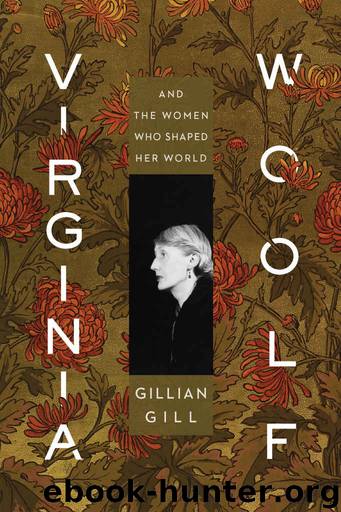Virginia Woolf: And the Women Who Shaped Her World by Gillian Gill

Author:Gillian Gill [Gill, Gillian]
Language: eng
Format: azw3
Publisher: HMH Books
Published: 2019-12-02T16:00:00+00:00
Convinced that Moore had provided them with a philosophical basis for their personal conduct, Lytton Strachey and John Maynard Keynes, as both Apostles and Angels, were influential in transforming the Society from a place where homosexuality flourished unobserved to a place where homosexuality was zealously canvassed and actively practiced. These two men subsequently became leaders of the Bloomsbury group, and Virginia Woolf, in her 1921–22 account of the group between 1904 and 1914, states unselfconsciously and with complete accuracy that “Old Bloomsbury” was obsessed with “buggery”—this being the group’s preferred term for homosexual acts.
❧
The Cambridge of the Bloomsbury group was the construct of a specific period and a specific caste. Let us think of it for the time being as “Cambridge” in quotation marks, a group of elite young men that came into full flower in the early nineteenth century. This “Cambridge” had only a name in common with the small, nondescript town in the fens, and it was only one small but defining part of Cambridge University. In the years when the seeds of Bloomsbury were germinating, the colleges that composed Cambridge University had an unofficial hierarchy. Trinity and King’s were at the top and Downing and Selwyn somewhere at the bottom, with all the others (St. John’s, Clare, Queens’, Christ’s, St. Catharine’s, Jesus, Pembroke, Emmanuel, Peterhouse, Magdalene, Fitzwilliam, Corpus Christi, and Trinity Hall) jostling for their places in the middle. “Cambridge” was, almost to a man, Trinity and King’s.
I say “to a man” since, at least until the 1910s when the Newnhamites Katherine “Ka” Cox, Alix Sargant-Florence, Fredegond Fisher, Karin Costelloe, Frances Marshall, and the Olivier sisters, Bryn, Noël, Marjorie, and Daphne, clamored for membership, “Cambridge” was to all intents and purposes an exclusive men’s club. The (then two) women’s colleges, Newnham and Girton, stood outside the college hierarchy, a position symbolized by the long, hilly bicycle ride that separated the village of Girton from Cambridge. By 1882, Newnham and Girton students had been given leave to attend university classes and lectures and to sit the university Tripos examinations. They were not precisely Cambridge undergraduates, however, since it was not until 1947 that Cambridge University bestowed degrees upon women.
The men of “Cambridge” distinguished themselves by looking for approval, status, and ideas not from their dons or their parents or society at large, but from one another. As Clive Bell would later write in his 1933 paper to the Memoir Club, “We were anarchical in our disrespect and in our skepticism; we had broken more successfully with the public school tradition; we were desperately serious about art and frivolous about almost everything else. We were not ashamed of being childish, of playing stump cricket, ping pong & racing pennies along the coping of Trinity Bridge; we were never boyish.”
Most “Cambridge” men went in for classics and moral sciences, Triposes that did not require a man to get up in the morning, and it was a mark of intellectual superiority in them to leave university lectures and classes to the women.
Download
This site does not store any files on its server. We only index and link to content provided by other sites. Please contact the content providers to delete copyright contents if any and email us, we'll remove relevant links or contents immediately.
| Crime & Criminals | LGBT |
| Special Needs | Women |
We're Going to Need More Wine by Gabrielle Union(19034)
Pimp by Iceberg Slim(14488)
Bombshells: Glamour Girls of a Lifetime by Sullivan Steve(14054)
The Radium Girls by Kate Moore(12018)
Becoming by Michelle Obama(10020)
Educated by Tara Westover(8045)
The Girl Without a Voice by Casey Watson(7885)
Wiseguy by Nicholas Pileggi(5769)
The Wind in My Hair by Masih Alinejad(5091)
Hitman by Howie Carr(5089)
The Rules Do Not Apply by Ariel Levy(4957)
Hunger by Roxane Gay(4921)
On the Front Line with the Women Who Fight Back by Stacey Dooley(4870)
Year of Yes by Shonda Rhimes(4754)
The Borden Murders by Sarah Miller(4313)
Papillon (English) by Henri Charrière(4262)
Joan of Arc by Mary Gordon(4100)
American Kingpin by Nick Bilton(3875)
Patti Smith by Just Kids(3774)
